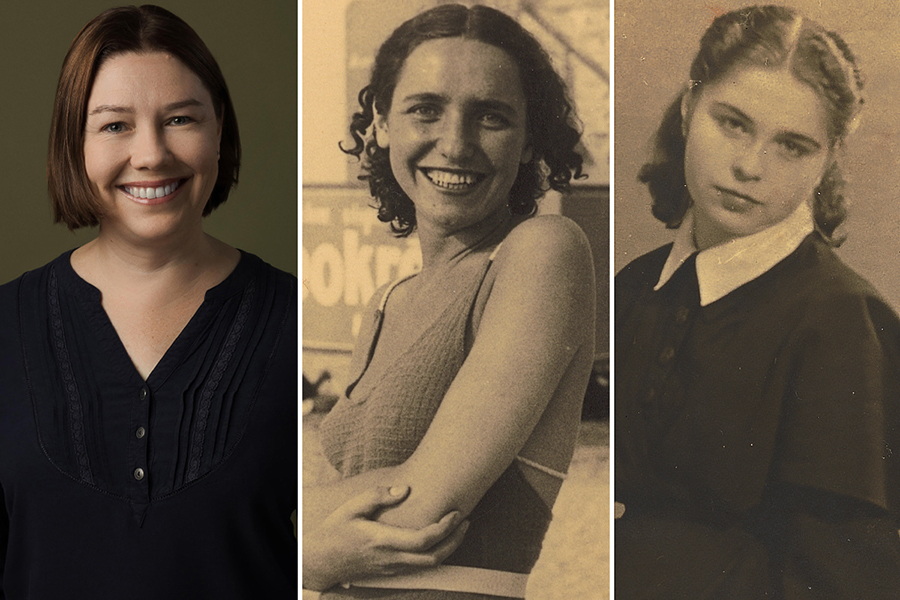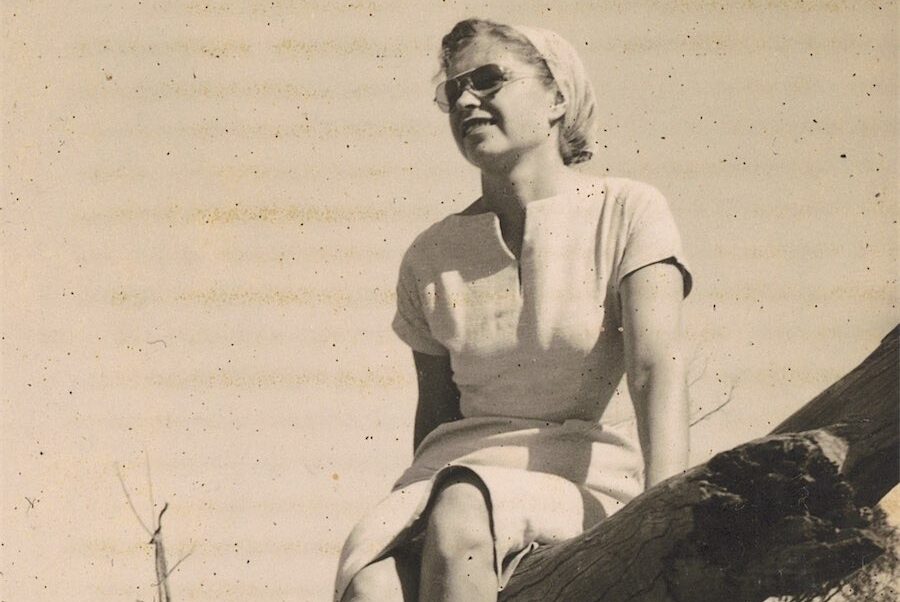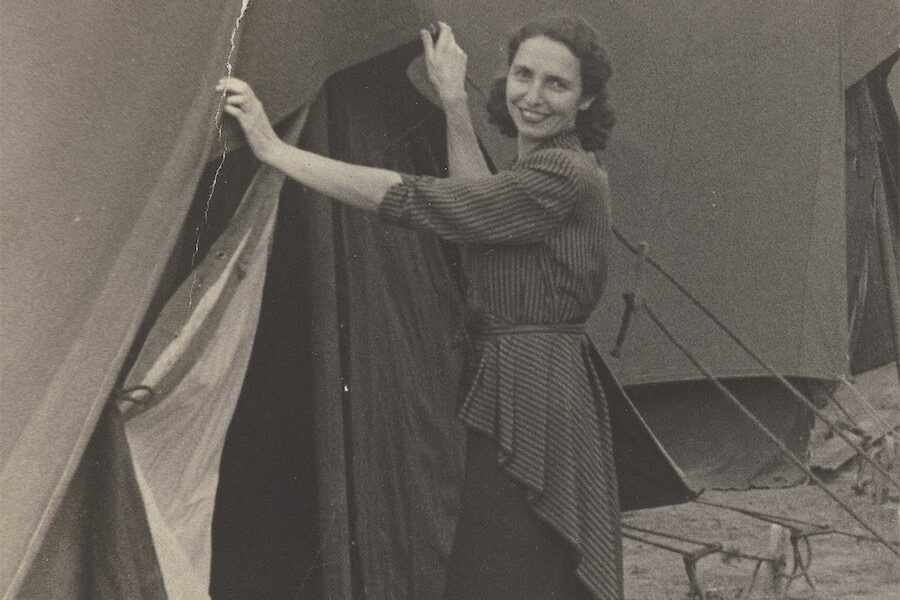 Author Andra Putnis with her maternal grandmother, Milda Seja, left and paternal grandmother, Aline Balulis, both pictured in the late 1930s.
Author Andra Putnis with her maternal grandmother, Milda Seja, left and paternal grandmother, Aline Balulis, both pictured in the late 1930s.
Last year, author Andra Putnis published a book about the astonishing lives of her Latvian grandmothers. Next month she is to “complete the circle”. In his series of stories of remarkable Canberrans, DAVID TURNBULL explains why.
Andra Putnis, her husband Michael and their son and daughter, Talis and Annija, are going to Latvia in July.
But it is not a holiday.
Andra is going to Latvia to launch a book she’s written about her two grandmothers – Stories My Grandmothers Didn’t Tell Me.
The launch, in the Museum of the Occupation of Latvia will complete a journey Andra set out on in 2002.
“The book has already been launched in Australia, but to take it to Latvia is like a homecoming. A homecoming after 80 years. It completes the circle.”
Andra had close contact with both her grandmothers growing up, and even by the age of 10 she’d become fascinated with them.
“I used to sneak into my grandmother’s room and look at all the mysterious Latvian things in her wardrobe. Fur coats, amber jewellery, brightly coloured traditional dance costumes.
“I guess, the stories of Latvia, of snow, the forests and maidens were like fairytales.
“But I stopped asking questions because the little glimpses I got about Latvia’s history, the Soviet and the Nazi occupations, war and the holocaust scared me. I could also see the memories that brought tears to their eyes.”
Just how they all came to be in Australia together is amazing in itself.
Andra’s paternal grandmother, Aline, and her maternal grandmother, Milda, migrated with their whole families after World War II.
But to different sides of the country,
Aline and her husband settled in Collie, WA, while Milda settled in Newcastle, NSW.
By coincidence, Aline had a Latvian friend who’d migrated to Newcastle, so she moved to Newcastle – a relocation that brought Andra’s mother, Inta, and father, Peter, together as children.
Andra first started writing her book in 2002 but she says she was naïve about how difficult it would be. Tracing all the history was one thing, writing it in a way that would be of interest to others was another.
She was also nervous about causing ructions within her family.
She parked the project and was consumed by adult life, working in the public service, getting married and starting her own family before picking it up again in 2019
“When I was young, my grandmothers were a big part of my life. One of my grandmothers lived with my family from the time I was 10 to 19,“ Andra says.
“I knew they had stories of growing up in Latvia and surviving World War II, but I only had glimpses.”
Andra’s grandmothers couldn’t have been more different.
 Aline Balulis pictured near Newcastle, c.1960.
Aline Balulis pictured near Newcastle, c.1960.
Her father’s mother, Aline, was – in her own words – a peasant who was raised near Kraslava, close to the border with Poland and Byelorussia (now Belarus).
She was raised in a strict Catholic family. The world she grew up in was a world where people worked the land, but they were well educated.
By contrast, Andra’s mother’s mother, Milda, spent much of her young life in Riga, the capital of Latvia. She was from a Lutheran family, and she loved everything about city life, especially the music, the dance and the Opera.
The grandmothers’ stories took different paths, but they shared the horrors of war – the loss of home and family, the constant fear of being shot or deported, the never-ending struggle for food, and shelter, and the endless trudge from one displaced persons camp to another in sub-zero temperatures with babes in their arms.
And then finally, migration to Australia, and a new life.
The year 1940-41 is known by Latvians as the Year of Terror.
On June 14 that year, the Red Army started knocking on doors and detaining whole families. In 24 hours 15,000 people were arrested as “enemies of the people” and shipped off to gulags in Siberia like cattle.
Initially, the Latvians hoped the German invasion would provide some respite, but it quickly became apparent it was just horror by another name.
And five years later, with Germany losing the war, the Russians came back!
Still in her teens when the Germans invaded, Aline naively signed up for a job that was supposed to be an adventure with a girlfriend.
It was a terrible mistake that meant she would never see her parents again.
Fending for herself in strange surroundings, she had a child out of wedlock and then was befriended by a priest who she eventually married.
“She struggled with that all her life, but it was just what happened to her. She grew to be a very warm and reflective person,” Andra says.
 Milda Seja at at Greta migrant camp, NSW, 1952.
Milda Seja at at Greta migrant camp, NSW, 1952.
At 24, Milda was on top of the world.
“I love this life” she used to tell her friends as they strolled down the streets of Riga.
Dark haired with a slim build she was stunningly attractive, and she married Rudis – a young radio technician who was just as handsome.
They soon had a son, and during the German occupation spent a lot of time apart, as Rudis was conscripted into the army. All in all they survived that period reasonably well, but when Germany started losing the war Latvia was thrown into chaos yet again.
Every train out of Riga was full of German soldiers and Latvians trying to escape the Russians.
With no communications, Milda lost contact with her husband.
She fled heavily pregnant and with her first born still in a pram.
After crossing the Baltic Sea with allied bombers overheard, they arrived in Gotenhafen.
Milda’s waters broke as she was trudging along the road, and her dress froze to her skin. She gave birth to her second son in a makeshift medical centre.
The matron brought her newborn son wrapped in a mattress.
“Only bring him out to feed, and change, or he will freeze to death,” the matron warned.
With no time to recuperate, Milda was then forced to trudge through the snow for 300 kilometres to a Displaced Persons camp in allied territory after the war.
And that was the pattern for the next five years. Camp after camp after camp.
A constant search on notice boards and word of mouth failed to find any trace of Rudis, so with the Russians still occupying Latvia, Milda migrated to Australia.
Unknown to each other, Aline and husband Eddy did the same, and after completing their work contracts they all found themselves in Newcastle, part of a small but passionate Latvian community.
Andra admits writing the book was a long, and sometimes painful process.
“When I went to the occupation museum in Latvia in 2006 the weight of what Aline and Milda had gone through came into terrifying focus.
“I couldn’t understand how people who’d suffered so much could be so loving, so gentle, so caring of others…just cuddly grandmas.
“What have I taken out of it?
“It’s that there can be so many different parts to one person’s life… dark times… even horrific times… but then children, and laughter, and so much love.”
She says it has also given her a much clearer sense of who she is, of where she fits in the world.
“I’m Australian, but when I go to Latvia, I feel connected to the earth there.
“You can belong to more than one place.”
Andra Putnis is the artistic director of the Canberra Writers Festival, which will be held in October.
Journalist David Turnbull is writing a series of profiles about interesting Canberrans. Do you know someone we’ve never heard of? Share the name in an email to David via editor@citynews.com.au
In a world of spin and confusion, there’s never been a more important time to support independent journalism in Canberra.
If you trust our work online and want to enforce the power of independent voices, I invite you to make a small contribution.
Every dollar of support is invested back into our journalism to help keep citynews.com.au strong and free.
Thank you,
Ian Meikle, editor